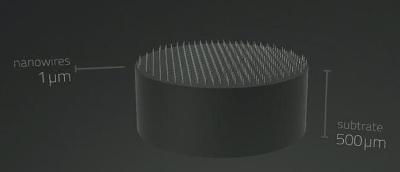The Norwegian University of Science and Technology (NTNU) researchers have patented GaAs nanowires grown on graphene, which is a hybrid material demonstrating competitive properties.
 Nanowires on substrate (illustration: CrayoNano)
Nanowires on substrate (illustration: CrayoNano)
The researchers are now involved in the commercialization of the hybrid material through their company, CrayoNano. Semiconductors grown on graphene hold potential to serve as the cornerstone for a variety of device systems and to transform the semiconductor industry. The researchers have described the technology that underpins their work in the Nano Letters journal.
Professor Helge Weman, one of the researchers, informed that the new patented hybrid material demonstrates exotic optoelectronic properties. The researchers were able to integrate flexibility, transparency and low-cost benefits into their new electrode. The patented method utilizes molecular beam epitaxy (MBE) to grow semiconductor nanowires over graphene. This is a template for a novel fabrication technique for semiconductor devices. LEDs and solar cells are expected to be the first products in line while considering future applications.
Companies such as Samsung and IBM are spurring graphene development as they seek a substitute for silicon in electronics applications like flexible touch screens for mobile phones. NTNU invention is perfectly compatible with their existing production machinery, enabling them to upgrade their consumer electronics to a new level where they can have innumerable design options. Hence, this invention shows promise to serve as a future platform for optoelectronics and electronics devices.
One potential device with a high commercial value is a nanowire solar cell, which is also flexible, inexpensive and efficient. The invention may be useful in the development of future self-powered nanomachines and sophisticated 3D ICs constructed on graphene and semiconductor nanowires, thus allowing for smaller footprint high-efficiency electronics.
Weman envisages the development of flexible self-powered consumer electronics that can be included into anything from clothes to cell phones, notepads, tablets and exercise accessories.